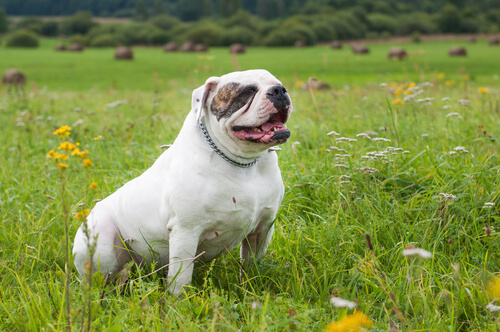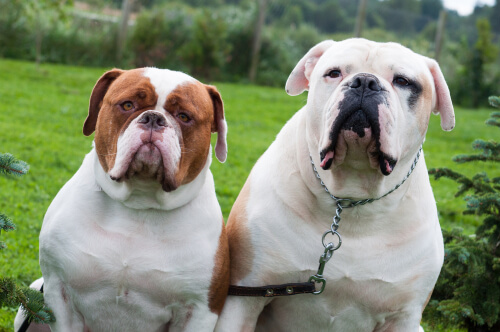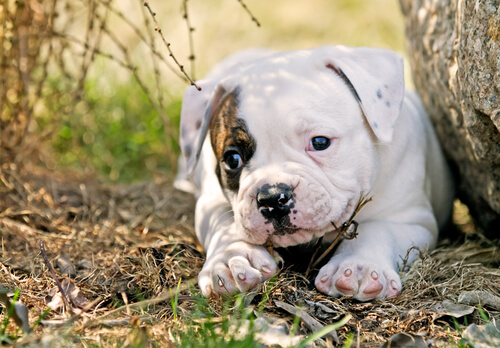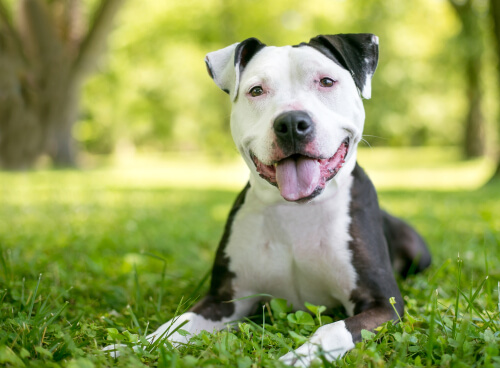
| Kingdom | Animalia |
| Phylum | Chordata |
| Class | Mammalia |
| Order | Carnivora |
| Family | Canidae |
| Genus | Canis |
| Species | C. lupus |
| Species | C. lupus familiaris |
| Niche | Domestic |
| Height | 20-26 inches (50-65 cm) |
| Weight | 75-125 lbs (34-57 kg) |
| Lifespan | 10-15 years |
| Social Structure | Social, domesticated |
| Breed Status | Common |
| Preferred Habitat | Domestic |
| Average Litter Size | 7-16 puppies |
| Main Food Item | Dog Food |
The Basics
The American Bulldog is a large breed of domestic dog with a long-standing association with American culture. It is a descendent of the Old English Bulldog, which is now extinct. They are common pets and show dogs and are also still used on animal farms as work dogs. There are two described body morphs of the breed, the ‘bully’ type, which is larger with a shorter muzzle, and the ‘standard’ morph, known for their athleticism and longer snouts.

American bulldogs are stocky and muscular. They have large heads and very strong chests and shoulders. Its coat is short and requires very little maintenance. Most American Bulldogs are white or mostly white, although a vast array of patterns and colors now exist.
They are relatively quick for their size, due to their history as working dogs and more. There are multiple body morphs, such as the “Bully” or “Classic” type, the “Standard” morph as well as various hybrids and alternate names for these strains of the breed. Their size and shape see them sometimes confused with other breeds, such as the Dogo Argentino and American Pit Bull Terriers.
Old English bulldogs were kept by working-class people in the American south as far back as the 1600s. There were used as all-around working dogs by owners of farms and ranches. They were also used as guard dogs and catch dogs while hunting. The south was overrun with feral pigs with no native predators, and bulldogs were used to try to combat the pests. This may be what allowed them to thrive at times in the past, helping them to persist until the present day.
As Pets
As Pets, bulldogs are intelligent and affectionate companions. They are good family dogs but require a significant amount of physical activity. They are a happy and fun-loving breed and enjoy having sufficient space to roam, preferably a fenced backyard. Some individuals can adapt to apartment living and urban life but will require many walks. In fact, they are great pets for people who love to run. They get along well with children and other pets but can be territorial and suspicious with unfamiliar people and dogs. It is important particularly socialize them early.
With their excellent companionship comes some drawbacks. Primarily, they are not well-suited to owners who are not able to spend most of their time with them, as they do not enjoy too much time alone. Like most dogs, if they are not getting enough exercise and attention, they may become destructive out of boredom. Females typically give birth to litters of about 7-16 puppies, and individuals usually live for about 10-15 years.

Fun Facts about American Bulldog!
Traditionally, American Bulldogs are known as effective hunters, workers, and more. Nowadays, they are known more for their goofy misdemeanor and their excellent companionship as pets.
More than Appearances
The breed was originally developed by people who brought Old English Bulldogs to America. Generally, these were working-class immigrants and they bred their dogs to complete work for them on their homesteads and ranches. For this reason, the breed was not developed in a particularly prestigious way, with regards to appearances above all else, as some dogs were. Instead, this breed is defined as much by what they can do in terms of general work rather than how they look. By this measure, any dog capable of doing ‘real bulldog work’ might be considered a bulldog.
Hanging in There
Following World War II, the breed wasn’t used as much for work and thus nearly went extinct. They were still kept by people in the South as pets but focus on breeding them as ranchhands decreased significantly. It was the work of only a few breeders who scoured the south in search of viable individuals that revived and saved the breed. Today, they are common as pets, show dogs, and guard dogs.

No Way to Treat a Friend
An unfortunate part of the American bulldog’s past is its history for use as bull-bait. This cruel bloodsport pits an angry bull against another animal, in this case, a dog. This was a form of entertainment in the Old World and for early immigrants.
In fact, along with its decline in popularity and subsequent breeding program, this varied use of the breed is what has led to its different body morphs. The ‘bully’ type is indeed more similar to the “Classic” type used for the bull-baiting, hence its name. This may also explain how the breed in general is rather agile despite its large build.
